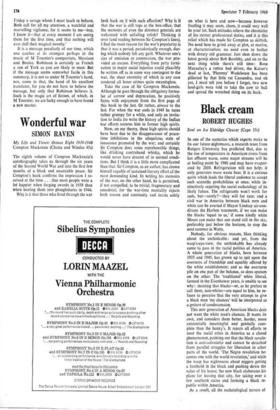Wonderful war
SIMON RAVEN
My Life and Times: Octave Eight 1939-1946 Compton Mackenzie (Chatto and Windus 45s) The eighth volume of Compton Mackenzie's autobiography takes us through the six years of the Second World War and into the first few months of a bleak and unamiable peace. Sir Compton's book confirms the impression I re- ceived at the time . . . that most people were a lot happier when forging swords in 1939 than when beating them into ploughshares in 1946.
Why is it that those who lived through the war look back on it with such affection? Why is it that the war is still tops at the box-office, that the memoirs of even the dimmest generals are welcomed with unfailing relish? Thinking it over (and reading between Sir Compton's lines), I find the main reason for the war's popularity is that it was a period, paradoxically enough, dur- ing which nobody felt any guilt. Whatever one's sins of omission or commission, the war pro- vided an excuse. Everything from petty forni- cation to major social injustice could plausibly be written off as in some way contingent to the war, the sheer enormity of which in any case rendered all lesser crimes quite meaningless.
Take the case of Sir Compton Mackenzie. Although he goes through the obligatory formu- lae of sorrow and deprecation, he positively fizzes with enjoyment from the first page of this book to the last. Or rather, almost to the last. For when the war ends in 1945 he turns rather grumpy for a while, and only an invita- tion to India (to write the history of the Indian war effort) restores him to former high spirits.
Now, on my theory, these high spirits should have been due to the disappearance of peace- time inhibitions in the ubiquitous state of innocence promoted by the war; and certainly Sir Compton does some reprehensible things, like drinking contraband whisky, which he would never have dreamt of in normal condi- tions. But I think it is a little more complicated than that. Sir Compton, as an author, has shown himself capable of sustained literary effort of the most demanding kind. In writing his memoirs of the war, on the other hand, he is permitted, if not compelled, to be trivial, fragmentary and anecdotal; for the war-time mentality rejects both reason and continuity and insists solely on what is here and now—because however footling it may seem, chum, it could very well be your lot. Such attitudes relieve the chronicler of his sterner professional duties, and it is this relief which has made Sir Compton so skittish. No need here to grind away at plot, at motive, at characterisation; no need even to bother with dreary old grammar. Just slam down the latest gossip about Bob Boothby, and on to the next thing while there's still time: Rose Macaulay's a rotten bad driver, the. Kaiser's dead at last, `Plummy' Wodehouse has been pilloried by that little rat Cassandra, and oh yes, I must tell you before I forget, two new land-girls were told to take the cow to bull and spread the wretched thing on its back.






































 Previous page
Previous page